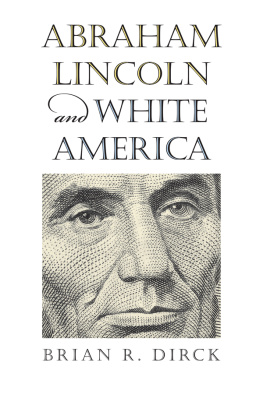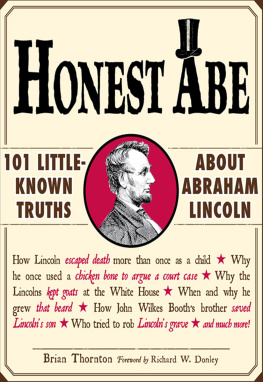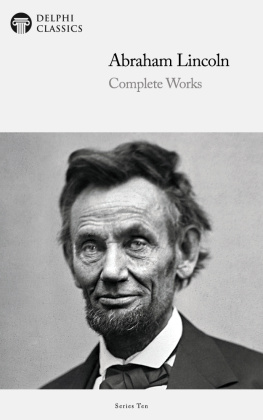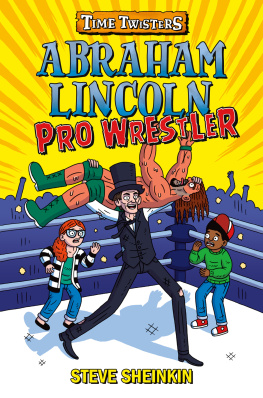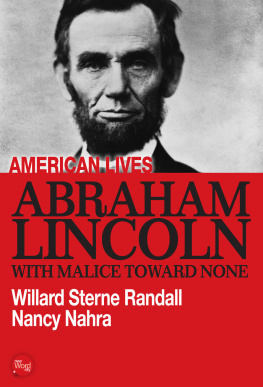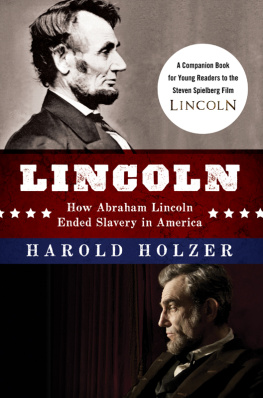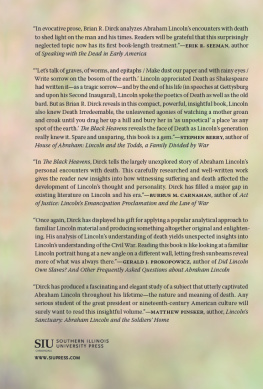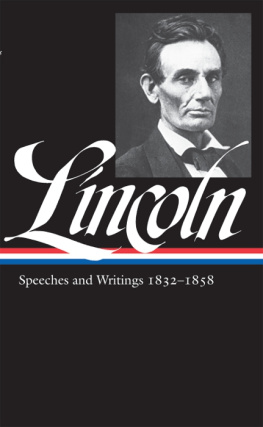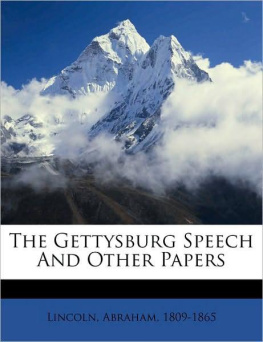ABRAHAM LINCOLN AND
WHITE AMERICA
A braham L incoln
AND
W hite A merica
Brian R. Dirck
University Press of Kansas
2012 by the University Press of Kansas
All rights reserved
Published by the University Press of Kansas (Lawrence, Kansas 66045 ), which was organized by the Kansas Board of Regents and is operated and funded by Emporia State University, Fort Hays State University, Kansas State University, Pittsburg State University, the University of Kansas, and Wichita State University
Library of Congress Cataloging-in-Publication Data
Dirck, Brian R., 1965
Abraham Lincoln and white America / by Brian R. Dirck.
p. cm.
Includes bibliographical references and index.
ISBN -0-7006-2111-8 (pbk. : acid-free paper)
ISBN -0-7006-2182-8 (ebook)
Lincoln, Abraham, 1809 1865 Relations with
African Americans.. African AmericansHistoryTo 1863 .
African AmericansHistory 1863 1877 .. Lincoln, Abraham,
1809 1865 Political and social views.. SlavesEmancipation
United States.. United StatesPolitics and government
1861 1865 . I. Title.
e457.2 . d565 2012
973.7092 dc
2012001796
British Library Cataloguing-in-Publication Data is available.
Printed in the United States of America
10 9 8 7 6 5 4 3 2 1
The paper used in this publication is recycled and contains percent postconsumer waste. It is acid free and meets the minimum requirements of the American National Standard for Permanence of Paper for Printed Library Materials Z 39.48 - 1992 .
for julie
Preface
Most people like Abraham Lincoln. He has his critics, to be sure, and any mature evaluation of his character must include recognition of his entirely human shortcomings, mistakes, and oddities. But on the whole, it is fair to say that the vast majority of Americans, indeed a fair number of people around the world, find Lincoln to be an appealing mana good guy. He got things right most of the time, and even when he didnt, we generally believe he had his heart in the right place.
This is one reason why people avoid asking hard questions about him. Americans would much rather talk about his triumphs: his rags-to-riches life story, his crusade against slavery in the 1850 s, his presidential leadership, and his eventual triumph as savior of the Union and as the Great Emancipator. These are good stories that reflect well upon a good person, and it is easy for Americans to celebrate these stories, over and over again. This is completely understandable. Americans are no more or no less given to lionizing their heroes than any other people.
But it is the sometimes unenviable task of professional historians to probe deeper and darker truths and to ask uncomfortable and even ugly questions about even the best of the men and women of Americas past. And there is no darker, uglier area of American history than racism. With all its painful afflictions, racism has shaped America since Europeans first arrived, and it continues to do so today. Would that it were not so. All Americans of goodwill wish racial prejudice had never stained a nation that otherwise stands for so much that is honorable and just.
But wishful thinking about Americas past is at best a distortion and at worst an invitation to perpetuate past mistakes in the present and future. This is no less true when we examine the life and times of our greatest American heroes. If we ignore Abraham Lincolns mistakes and limitations, we create a blind spot in our historical consciousness not only about a vitally important individual but also about the operations of American history as a whole.
In pursuing this inquiry into Abraham Lincoln and racespecifically, his views concerning whiteness and white racial identityI found that Lincoln very definitely functioned under a set of limitations where race was concerned. He was in many ways a product of the predominant white culture of his time, and he was far less willing or able to transcend the limitations of that culture than I would have wished. In many respects, he was a typical nineteenth-century American white man, with all the problems and shortcomings this entailed.
Yet at the end of the day, he was still a likable man. He did not, it is true, fundamentally question the underpinnings of white supremacy, along the lines of radical abolitionists such as Theodore Dwight Weld or William Lloyd Garrison. He could have done more to confront white bigotry. And he might well have been capable of transcending the limitations of his whiteness to a greater extent than he did. He was far from perfect, and there were troubling moments in his life during which he seemed to cater to white Americas worst instincts.
But after all was said and done, I found that Lincolns approach to these matters was better than that displayed by most whites of his day. He was a flawed, eminently human, and yet still fundamentally admirable American white man. And perhaps this is where we as Americans should aim when we seek a mature perspective on Abraham Lincoln: critically informed admiration, of the sort that allows us to both celebrate his considerable accomplishments and simultaneously recognize his limitations. This is the only truly honest approach possible.
Acknowledgments
I decided long ago that I would make it a point to thank my mentor and friend, the late professor Phillip Paludan, in any book of history that I write. Phils untimely passing in August 2007 left a hole in many peoples lives that is impossible to fill. For my own part, I greatly miss Phils wisdom, wit, and vast knowledge of the Civil War era. But I draw some comfort in the thought that I was able to benefit from his advice and guidance, and I hope my scholarship reflects well on his tutelage.
Fred Woodward, my editor at the University Press of Kansas, persevered through what was a difficult writing process. Im afraid I tested his nearly inexhaustible patience on more than one occasiona fact which causes me no small distress, since he is not only a first-rate editor but also a very nice man. Fred should receive a great deal of credit for anything of value to be found in this book.
More generally, the staff at the University Press of Kansas performed their various editing and publishing tasks to their usual superb standards. Sara Henderson White, Kelly Chrisman Jacques, and Susan Schott ably shepherded the manuscript through the illustration, copyediting, and marketing processes. Gerald Prokopowicz, professor of history at East Carolina Universityand a very fine Lincoln and Civil War scholaracted as peer reviewer for this manuscript, and gave me absolutely indispensable advice and encouragement. They have all saved me from numerous gaffes. Any remaining mistakes are, of course, my responsibility alone.
During the research stages of this project, I was (as always) aided immeasurably by the staff at Anderson Universitys Nicholson Library. Jan Brewer and Barbara Hoover have always been ready and willing to help. Jill Branscum of the Interlibrary Loan Department brought her expertise to the task of locating the sort of off-beat and obscure materials that delight us historians (but probably drive librarians to distraction).





